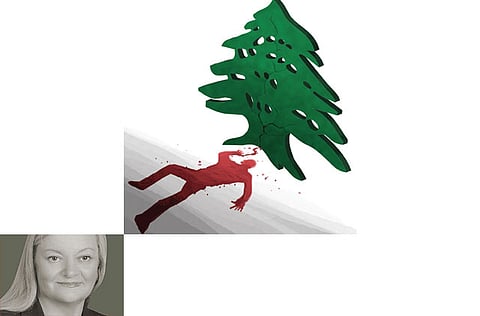A whodunit tearing Lebanon apart
A whodunit tearing Lebanon apart

The assassination of 47-year-old Brig. Gen. Wissam Al Hassan in Beirut’s largely Christian Ashrafieh district was not only a crime against the head of Lebanon’s Internal Security Forces (ISF) and others killed or injured by the bomb blast, no-one in the country can escape its repercussions. Angry protestors have sealed off areas while large swathes of the capital are deserted as people stay indoors to avoid entanglement in a potential violent backlash amid sounds of gunfire and the acrid smoke of burning tyres.
The killing of such an influential individual with natural affiliations to the March 14th movement but generally recognised for fulfilling his duties in a non-partisan fashion, should bring a grieving nation together; not so in Lebanon where most people are already pointing fingers at likely culprits.
In the hours following the senseless tragedy, Lebanon had become a breeding ground for conspiracy theories. Saad Hariri, son of the slain former Lebanese prime minister Rafik Hariri, who heads the opposition, has already reached his conclusions. He has called upon his countrymen and women to personally “attend the funeral of Wissam Al Hassan, who protected Lebanon from the plot of Bashar Al Assad and Ali Mamluk” [Syria’s intelligence chief].
He later explained his theory on CNN. “A month ago, Wissam Al Hassan caught red-handed a former Lebanese minister, Michel Samaha, with 50 kilograms of explosives due to be exploded in Lebanon. Fortunately at the time, Wissam Al Hassan was able to catch the former minister and unfortunately today Wissam Al Hassan paid the price for his success just a month and a half ago. This regime is killing its own people so it will not think twice about killing the Lebanese…”
Druze leader Walid Jumblatt supports his position. Adding grist to their mill are threatening text messages purportedly sent from a number in Syria to politicians known to oppose Syria and Hezbollah that read “Congratulations. The countdown has begun.”
Hariri has also implicated Hezbollah and by association Iran. “Syria today is becoming a proxy of Iran, as also some of the allies of Syria in Lebanon are proxies of Syria and proxies of Iran,” he said. It’s no secret that Al Hassan was opposed to Syrian meddling in his country and was often aligned with Hezbollah’s detractors. Lebanon’s Prime Minister Najeeb Mikati, who reacted to the assassination by offering to step-down, shares Hariri’s view; he later made a U-turn on Twitter tweeting he would stay on for the sake of Lebanon’s stability. “Chaos is not an option for me…” he wrote.
Hezbollah and its Syrian ally have denied any involvement. Their joint patron Tehran condemned the car bomb attack but was quick to lay blame on their usual suspects the Israelis. “Without a doubt the main enemy of the people of Lebanon and the region is the Zionist regime, which benefits from insecurity and instability in the region” reads a quote from a foreign ministry spokesperson posted on the ministry’s website.
A spokesman from Israel’s foreign ministry called that assumption “beyond pathetic”, adding, “after the Iranian regime accused Israel of even the bad weather conditions prevailing in Iran, is there anything at all they would not automatically blame on Israel?” In fact, like Syria, Israel does have a motive as Al Hassan was instrumental in busting a number of Israeli spy rings and arresting Israeli collaborators such as Fayez Karam a former Lebanese Army officer and politician convicted of passing secrets to Tel-Aviv.
A column in the Lebanese Arabic daily As Safir ratchets up the mystery. The writer points out that no officer in the ISF’s directorate, including the Director-General Ashraf Rifi, was aware that Al Hassan was in Lebanon until the news of his assassination broke. “When the blast took place, Rifi believed that Al Hassan was in France,” the article maintains. “However, Al Hassan had arrived in Lebanon yesterday [October 18th]. Al Hassan returned to his family’s home in France after being in Berlin, while the security agreement with Rifi specified that Al Hassan was to remain outside Lebanon for one week.”
According to Rifi, neither he nor anyone else within the directorate knew of Al Hassan’s travel itinerary or security arrangements, which, if true, seems to indicate that the informant had to have been a trusted person close to him.
The article goes on to what the appetite of chronic conspiracy theorists, quoting Rifi as saying, “Al Hassan was not identified by his body, as it was unrecognisable. He was identified by a part of his gun, his rifle and his bodyguard’s mobile phone. Yet his wristwatch was the ultimate proof.”
Of course, a wristwatch is no proof at all which leads one to imagine that Rifi harbours the suspicion that Al Hassan might be soaking up the sun in some far-flung land.
It’s too early to jump to unproven conclusions. The only thing known for sure is that Lebanon has received another body blow sending its people reeling. There have been violent clashes between pro-Syrian and anti-Syrian Lebanese in Tripoli. The fear is that yet another sectarian conflict is brewing. The worst case scenario would be for Lebanon to become embroiled in Syria’s civil war. Rather than hype the ante, Lebanon’s political and religious elite should work to calm the situation down before the heat is turned up when there’ll be no going back.
Linda S. Heard is a specialist writer on Middle East affairs. She can be contacted at lheard@gulfnews.com



